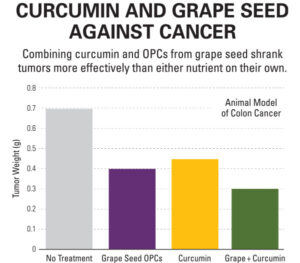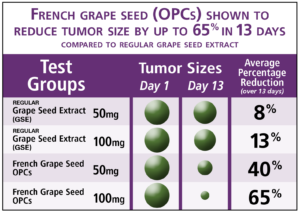New Research: 6 Groundbreaking Cancer Studies on FRENCH GRAPE SEED EXTRACT (OPC)
FRENCH GRAPE SEED EXTRACT: On the Front Line of Cancer Research
You may have heard about grape seed extracts as being especially valuable for preventing or treating heart-related conditions. But a specific French grape seed extract containing only small, absorbable oligomeric proanthocyanidins (OPCs) has shown an amazing capacity even beyond protecting cardiovascular health, as critical as that is.
Researchers have found that this botanical extract fights cancer through a multitude of pathways, shrinking tumors, stopping its spread, and even killing cancer cells outright—all without harming healthy cells along the way. In fact, these studies show that this French grape seed extract may be the next breakthrough in fighting—and possibly reversing—cancer.
WHY GRAPE SEEDS? What Makes Them So Valuable?
We’ve known for a long time that grapes provide a wide range of healthenhancing benefits. The wine-friendly French diet is a case in point, with its intake of anthocyanin compounds from the skins and fruits of grapes used in a variety of vintages, from Chablis to Merlot. But the truth is, incredible nutrient riches are found in the seeds of grapes, too.
The study of grape seed oligomeric proanthocyanidins (OPCs) developed in a roundabout way. A French professor, Jacques Masquelier, was fascinated by the history of explorer Jacques Cartier’s crew making a tea of pine bark that saved them from scurvy. And pine bark and grape seeds have one thing in common: both contain OPCs. So, using a locally-available source while working in the wine-rich region of Bordeaux, Masquelier pioneered extracting OPCs from grape seeds. And these OPCs have proven to be incredibly valuable.
As antioxidant compounds, grape seed OPCs are better free radical scavengers and inhibitors of oxidative tissue damage than vitamin C, vitamin E, or beta carotene. Additionally, they have anti-inflammatory properties, can help preserve healthy arteries and blood vessels, and as seen in the research highlighted here, are astoundingly strong cancer fighters.
1 – French Grape Seed Extract (OPCs) and Berberine Work Synergistically to Stop Cancer
Cells from Colonizing, Migrating, and Proliferating
Okunu K, Garg R, Yuan YC, Tokunaga M, Kinugasa Y, Goel A. Berberine and oligomeric proanthocyanidins exhibit synergistic efficacy through regulation of PI3K-Akt signaling pathway in colorectal cancer. Front Oncol. 2022;12:855860
Berberine is an alkaloid compound found in many plant sources, including Indian barberry (Berberis aristata). Berberine research is
often on diabetes and heart disease, with excellent benefits noted for metabolic syndrome. However, researchers are now investigating its
ability to fight cancer and tumor formation.
That’s because berberine has strong anti-inflammatory action that inhibits the tumor-formation process and also works through pathways in the body that reduce cancer cell growth. It turns out that French grape seed extract OPCs also work through those same pathways, in this case the PI3K-Akt signaling pathway. While each botanical was effective in stopping the ability of colon cancer cells to clone, form colonies, and migrate, the combination of both were up to 4.8 times more effective than either one on their own.
Grape seed OPCs combined with berberine work together through unique pathways that dramatically stop cancer growth and spread.

2 – French Grape Seed Extract (OPCs) and Andrographis Shrinks Tumors, May Stop Chemo-Resistance
Shimura T, Sharma P, Sharma GG, Banwait JK, Goel A. Sci Rep. 2021 Apr 6;11(1):7548.
Like French grape seed extract, andrographis also shows strong anti-canceractivity. The andrographis used in this study (EP80) is standardized to 20% (80 mg) andrographolides, key compounds of this Ayurvedic herb. This extract has previously been shown to enhance the effectiveness of conventional chemotherapy drugs.
Both French grape seed OPCs and andrographis stopped cancer cells and reduced tumor size individually. However, when combined, they were incredibly effective.
Compared to untreated colon cancer cells, the two botanicals literally shrink away the weight of the tumor by an astonishing 81.5 percent! Additionally, both French grape seed extract and andrographis make the conventional chemotherapy drug, 5-fluorouracil (5-FU), more effective. Colorectal cancer is the third most common cancer worldwide, and conventional treatment often becomes ineffective as the cancer cells develop resistance to chemotherapy, sometimes called “chemoresistance.” Fortunately, these two tumor-stopping botanicals may provide an answer. That’s because they work along a multitude of pathways compared to standard drugs, stopping tumor growth and spread, and making conventional chemotherapy drugs more effective at the same time.
In other words, THIS COMBO STOPS CANCER!
Combining OPCs with andrographis greatly enhances each botanical’s tumor-shrinking effects.

3 – French Grape Seed Extract (OPCs) and Curcumin Blended With Turmeric Essential Oils Stopped Cancer Cells from Replicating
Ravindranathan P, et al. A combination of curcumin and oligomeric proanthocyanidins offer superior anti-tumorigenic properties in colorectal cancer. Sci Rep. 2018 Sep 14;8(1):13869.
OPCs travel through many paths in the body to stop tumors. While they are powerful on their own, they work extremely well with clinically studied curcumin.
In this scientific study using a model of colon cancer, French grape seed extract (VX1) and curcumin blended with turmeric essential oil (BCM-95) were paired and tested against cancer cells. They did incredible work together, significantly reducing tumor size.
When OPCs are combined with curcumin, the anti-cancer effects are even stronger!

4 – French Grape Seed Extract (OPCs) Demonstrated Tumor Suppression by 90% in 14 Days
Toden S, Ravindranathan P, Gu J, Cardenas J, Yuchang M, Goel A. Oligomeric proanthocyanidins (OPCs) target cancer stem-like cells and suppress tumor organoid formation in colorectal cancer. Sci Rep. 2018;8(1):3335.
A specific pathway in the body, called “Hippo-YAP”, needs to be down-regulated in order to stop cancer cells from regenerating. It is a challenging pathway to block. Fortunately, OPCs from a tannin-free, French grape seed extract (VX1) are strong enough to do it.
A cell study showed that these OPCs reduced viable cancer stem cells by 71%. An animal model found that these OPCs suppressed tumor growth by 90% in 14 days with 300-600 mg daily of tannin-free, French grape seed extract (OPCs).
OPCs from a tannin-free, French grape seed extract are successful in the process of stopping cancer cells from regenerating.
5 – French Grape Seed Extract (OPCs) More Effective Against Cancer Than Standard Grape Seed
Ravindranathan P, Pasham D, Balaji U, Cardenas J, Gu J, Toden S, Goel A. Mechanistic insights into anticancer properties of oligomeric proanthocyanidins from grape seeds in colorectal cancer. Carcinogenesis. 2018 May 28;39(6):767-777.
Our bodies can only use what we absorb. If a compound from a natural medicine like grape seed extract can’t be absorbed, it can’t do any good. In an animal model of cancer, a study comparing tannin-free OPCs (VX1) against a plain, “unfractionated” grape seed extract shows the dramatic difference. IN JUST 13 DAYS…
- OPCs from French grape seed extract VX1 reduced tumor size by 65%.
- By contrast, the plain grape seed extract reduced tumor size by only 13% and 8%, at full and half doses respectively.
OPCs from French grape seed extract (VX1) have greater efficacy in treating cancer than plain grape seed extract.

6 – French Grape Seed (OPCs) Slowed the Growth of Chemoresistant Cells
Ravindranathan P, Pasham D, Goel A. Oligomeric proanthocyanidins (OPCs) from grape seed extract suppress the activity of ABC transporters in overcoming chemoresistance in colorectal cancer cells. Carcinogenesis. 29 Dec 2018.
Conventional chemotherapy doesn’t always finish off cancer cells. That’s why cancer can recur and spread throughout the body.
When cancer cells become resistant, simply giving more chemotherapy doesn’t work. Additionally, chemotherapy drugs may not be an option. Chemotherapy drugs can make people sick and weak, and damage healthy cells in the body in the process.
But OPCs can help. They slow the growth of chemoresistant cells and inhibit proteins that otherwise help cancer cells thrive. When OPCs from French grape seed extract were combined with chemotherapy in treatment of resistant colon cancer (animal model), the result was a 70% REDUCTION IN TUMOR WEIGHT.
Ultimately, this means that OPCs could make chemotherapy drugs more effective at lower dosages.

To Be Truly Effective, OPCs from Grape Seeds Must Be Tannin-Free
One major barrier to the effectiveness of any natural medicine is absorption. Unfortunately, many extracts only deliver large molecular weight tannins, which, due to their size, cannot be effectively absorbed, even through they are technically OPCs.
That’s why I prefer a tannin-free French grape seed extract that is standardized to provide only OPCs that are small enough to guarantee absorption, with a high level of polyphenols, including catechin, epicatechin, epicatechin gallate, dimers, trimers, and tetramers.
Because supplement labels sometimes count all OPCs as the same, whether they are small and absorbable or large and ineffective, it pays to check the label to ensure the product contains a verified source of the beneficial, absorbable OPCs.



